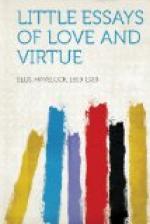We have to realise, however, that these transmutations do not only take place by way of a sublimation of sexual energy, but also by way of a degradation of that energy. The new form of energy produced, that is to say, may not be of a beneficial kind; it may be of a mischievous kind, a form of perversion or disease. Sexual self-denial, instead of leading to sublimation, may lead to nervous disorder when the erotic tension, failing to find a natural outlet and not sublimated to higher erotic or non-erotic ends in the real world, is transmuted into an unreal dreamland, thus undergoing what Jung terms introversion; while there are also the people already referred to, in whom immature childish sexuality persists into an adult stage of development it is no longer altogether in accord with, so that conflict, with various possible trains of nervous symptoms, may result. Disturbances and conflicts in the emotional sexual field may, we know, in these and similar ways become transformed into physical symptoms of disorder which can be seen to have a precise symbolic relationship to definite events in the patient’s emotional history, while fits of nervous terror, or anxiety-neurosis, may frequently be regarded as a degradation of thwarted or disturbed sexual energy, manifesting its origin by presenting a picture of sexual excitation transposed into a non-sexual shape of an entirely useless or mischievous character.
Thus, to sum up, we may say that the sexual energy of the organism is a mighty force, automatically generated throughout life. Under healthy conditions that force is transmuted in more or less degree, but never entirely, into forms that further the development of the individual and the general ends of life. These transformations are to some extent automatic, to some extent within the control of personal guidance. But there are limits to such guidance, for the primitive human personality can never be altogether rendered an artificial creature of civilisation. When these limits are reached the transmutation of sexual energy may become useless or even dangerous, and we fail to attain the exquisite flower of Purity.
III
It may seem that in setting forth the nature of the sexual impulse in the light of modern biology and psychology, I have said but little of purity and less of morality. Yet that is as it should be. We must first be content to see how the machine works and watch the wheels go round. We must understand before we can pretend to control; in the natural world, as Bacon long ago said, we can only command by obeying. Moreover, in this field Nature’s order is far older and more firmly established than our civilised human morality. In our arrogance we often assume that Morality is the master of Nature. Yet except when it is so elementary or fundamental as to be part of Nature, it is but a guide, and a guide that is only a child, so young, so capricious, that in every age its wayward hand has sought to pull Nature in a different direction. Even only in order to guide we must first see and know.




